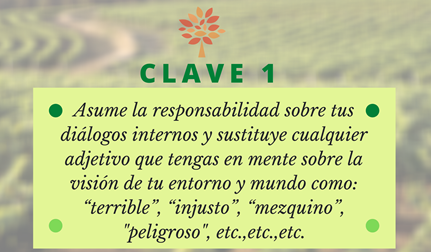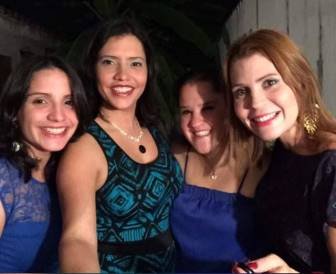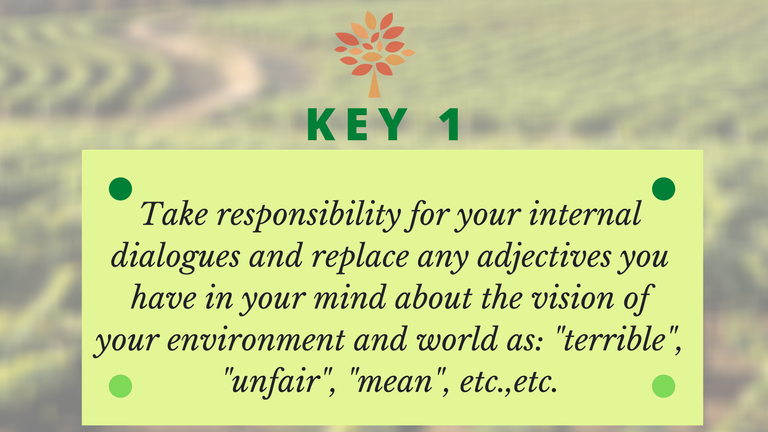Claves para transformar tu diálogo interno (Parte I)
English version below.
Saludos Hivers, quisiera retomar un tema del que había venido hablando en post anteriores sobre los “diálogos internos”, con la idea de compartirte algunos consejos que me han servido para transformar esas conversaciones que me hacían perder la paz y mi estado de armonía.
Haciendo un poco de contexto, en mi post titulado ¿Sabías que dedicamos en promedio 14 horas diarias hablando con nosotros mismos? me refería al diálogo interno, como esa conversación que tenemos con nosotros mismos cada día, esa cantidad de pensamientos que van y vienen y que nos ocupan la cabeza la mayor parte del tiempo, afectando de forma directa nuestros estados emocionales y la forma en la que actuamos en nuestro entorno.
Si ese diálogo es positivo, es decir, se basa en pensamientos armoniosos, sanos, equilibrados, enfocados en lo bueno, nos motiva a ser mejor cada día, nos impulsa a crecer, avanzar, vivir la vida en plenitud y alegría, y nos ayuda a darnos cuenta de los recursos que tenemos para sacarles provecho. Mientras que el diálogo interno negativo, nos lleva a poner el foco en lo que está mal, en los defectos, construir escenarios pesimistas o derrotistas y esto lejos de generar un estado de bienestar nos hace sentir mal anímicamente e incluso puede afectar seriamente nuestra salud.
A veces nos resulta súper fácil detectar cuando alguien de nuestro entorno está teniendo un diálogo interno negativo, pero no nos resulta tan obvio cuando se trata de nosotros mismos, por ello en mi post ¿Cómo detectar nuestro diálogo interno? dejé algunas ideas que nos pueden ayudar a activar ese observador interno para combatir esos monólogos negativos.

Y ahora pasamos a la acción, ¿Qué puedo hacer para transformar realmente esos diálogos que me limitan? ¿Cómo pasar de un diálogo interno negativo a uno positivo?. Inicialmente tenía pensado incluir todas mis sugerencias en este post, pero cuando escribí algunas de ellas se hizo un poco largo, así que el día de hoy voy a compartirte la primera clave:

No vuelques la responsabilidad en otros para echarles la culpa de tus diálogos internos y darle justificación a lo que ocurre en tu cerebro. Debemos comprender que la percepción que tenemos de lo que nos pasa, o aquello que creemos del mundo que nos rodea es lo que nos genera sufrimiento, pero es nuestra “visión”, “nuestra percepción”.
Esto podemos verlo con objetividad cuando nos damos cuenta que ante una misma situación pueden haber diferentes visiones del tema, entre positivas y negativas, incluso reacciones y formas de actuar. En un hogar de varios hermanos podemos ver la diferencia de personalidades y formas de pensar, a pesar de que fueron criados por las mismas personas. En mi caso, somos 4 hermanas y créanme que somos realmente diferentes en todo, hasta físicamente nos diferenciamos.

*Con mis bellas hermanas una noche decembrina
La visión que escojas tener es la que va a determinar cómo te vas a sentir y actuar frente a la vida
Veamos este ejemplo, si en mi diálogo interno me digo a mi misma: “mi jefe me estresa” o “mis hijos me ponen los nervios de punta”, de este modo estoy responsabilizando a otros del estado en el que me siento y lo cierto es que “Yo me estreso” o “Yo me pongo nerviosa” justamente por lo que pienso de mi jefe o mi situación laboral, o no tengo la suficiente paciencia o herramientas para abordar a mis hijos.
¿Cuál sería el trabajo entonces?
Tomar conciencia de que los responsables sobre nuestros estados emocionales somos nosotros mismos, ya que una situación puede provocar diferentes estados en diferentes personas. De aquí esa famosa frase de que “nadie puede herirte sin tu consentimiento”, por ello no le des poder a lo que no tiene poder y toma las riendas de tu mundo interior, es tuyo!!!
Otra recomendación dentro de esta primera clave es “Evitar llegar a conclusiones o suposiciones sobre lo que piensen los demás”, a veces construimos todo un entramado sobre lo que está pensando o haciendo el otro(s), podemos incluso caer en historias de complot súper elaboradas y nada de esto nos nutre positivamente, todo lo contrario.
Cuando estamos ante ese “otro” reaccionamos frente a él en función de todo el diálogo interno que me hice, lo que puede traducirse en actitudes de desconfianza, molestia, antipatía y demás expresiones corporales como una “mala cara”. Hacer conciencia de esto, nos puede dar hasta gracia si nos viene a la mente algún recuerdo cuando reaccionamos de forma anticipada ante una situación movidos por ese diálogo interno negativo, ¿Lo tienes?
Seguramente algún chiste entre marido y mujer pudo saltar a tu recuerdo para ejemplificar esto.
▶️ En mi próximo post seguiré revelando otras sugerencias que nos pueden ayudar a transformar nuestros diálogos, gracias por acompañarme hasta aquí!!! ◀️
Keys to transforming your internal dialogue
Greetings Hivers, I would like to take up again a topic that I had been talking about in previous posts on "internal dialogues", in order to give you some advice that allowed me to transform those conversations which would make me lose my peace and my state of harmony.
In my post entitled Did you know that we spend an average of 14 hours a day talking to ourselves? I referred to internal dialogue as the conversation we have with ourselves every day, the amount of thoughts that come and go and occupy our heads most of the time, directly affecting our emotional states and the way we act in our environment.
If that dialogue is positive, that is, if is based on harmonious, healthy, balanced thoughts, focused on the good, it motivates us to be better every day, it drives us to grow, to move forward, to live life to the fullest and with joy, and it helps us realize the resources we have to take advantage of. While the negative internal dialogue, leads us to put the focus on what is wrong, on the defects, build pessimistic or defeatist scenarios and this far from generating a state of well-being, makes us feel bad emotionally and can even seriously affect our health.
Sometimes it is super easy for us to detect when someone in our environment is having a negative internal dialogue, but it is not so obvious when it comes to ourselves, that is why in my post How to detect our internal dialogue? I discuss some ideas that can help us to activate the internal observer for it to combat those negative monologues.

And now we move to action, What can I do to really transform those dialogues that puts limits on me? How do I go from a negative internal dialogue to a positive one? Initially, I had planned to include all my suggestions in this post, but when I wrote some of them it got quite long, so today I'm going to share with you the first key:

Do not turn the responsibility on others to blame them for your internal dialogues and to give justification to what is happening in your brain. We must understand that the perception we have of what happens to us, or what we believe of the world around us is what generates suffering, but it is our "vision", "our perception".
We can see this with objectivity when we realize that in the same situation there can be different visions of the subject, between positive and negative, even reactions and ways of acting. In a household of several siblings we can see the difference in personalities and ways of thinking, even though they were raised by the same people. In my case, we are 4 sisters and believe me, we are incredibly different in many aspects.
The vision you choose to have is what will determine how you will feel and act about life
Let's look at this example, if in my internal dialogue I say to myself: "my boss stresses me out" or "my kids get on my nerves", in this way I am holding others responsible for the state I am in and the truth is that "I get stressed out" or "I get nervous" because of what I think about my boss or my work situation, or I don't have enough patience or tools to deal with my kids.
What would the job be then?
To become aware that we are responsible for our emotional states, as one situation can provoke different states in different people. Hence the famous phrase "no one can hurt you without your consent", so don't empower the powerless and take charge of your inner world, it's yours!
Another recommendation within this first key is Avoid reaching conclusions or assumptions about what others think. Sometimes, we build a whole concept on what others are thinking or doing, we can even fall into super elaborate stories, and none of this feeds us positively, quite the contrary.

Source: Pixabay
When we are in front of "others" we react to him/her based on all the internal dialogue we had, which can translate into attitudes of distrust, annoyance, antipathy and body expressions like a "bad face". Becoming aware of this can even be funny if we remember when we reacted in advance to a situation moved by that negative internal dialogue.
Surely some jokes between husband and wife could jump into your memory to exemplify this.
▶️ In my next post I will continue to reveal other suggestions that can help us transform our dialogues, thanks for joining me so far! ◀️
Translated with www.DeepL.com/Translator (free version)
Avatar creado en la app Bitmoji / Avatar created in the Bitmoji app
Banner diseñados en Canva / Banner designed in Canva

Hmm... Thanks for reblogging my post.
This is an interesting topic of yours. I also liked the way you choose to split keys to change your internal dialogue.
Having negative energy or thoughts in the mind keeps one from progress, and I try my best to keep it out. Most times it do come by and they things like: I am not good enough, life is unfair, I'm terrible and all sorts.
What I do to keep me up on fit is that I tell myself this phrase: BETTER DAYS AHEAD. If I have a bad moment, day or situation I try remind myself that it would later turn out well tomorrow and I should keep doing the best I do.
I look forward to read more keys of yours. Just followed you!
Upvoted and reblogged 😉👍
Great write up 👌
Muchas gracias por tu comentario y el reblog 🙏
Esa estrategia que usas es justamente una de las siguientes claves de las que voy hablar en un futuro post. Me alegra que te haya gustado y recibir tu feedback.
Bendiciones ✨
Thank you very much for your comment and the reblog 🙏
That strategy you use is just one of the next keys I'm going to talk about in a future post.
I'm glad you liked the post and I'm very grateful for your feedback.
Blessings ✨
Muchísimas gracias por su invaluable apoyo 🙏✨
¡Muy buena publicación @miriannalis! Coincido contigo en que muchas veces nos enfrascamos en un diálogo interno hostil y amargo hacia nosotros mismos, y lamentablemente ni cuenta nos damos de esto, lo que nos hace desperdiciar nuestro valioso tiempo y energía. Me parecen muy válida la sugerencia que das, porque hay que partir en primer lugar de ser conscientes de este hábito y luego ir corrigiéndolo de forma progresiva. Saludos y bendiciones para tí.
Gracias @tarot911 por tu comentario. Darnos cuenta es el primer paso de todo, hacer consciencia de lo que somos, lo que hacemos y la forma en que vivimos es lo que nos trae noticias para generar los cambios que necesitamos.
Bendiciones ✨
Como dicen por allí, "el enemigo más grande que tienes eres tú mismo", y es cierto, muchas veces nos autosaboteamos, nos ponemos las cosas más difíciles de lo que realmente son; por eso es que considero a tu post MUY MUY MUY ÚTIL, porque permite que nos demos cuenta de ese diálogo interno y como convertirlo en algo más amigable y mejor para nosotros mismo. Me gustó mucho. Un gran abrazo.
As they say over there, "the greatest enemy you have is yourself", and it is true, many times we sabotage ourselves, we make things more difficult than they really are; That is why I consider your post VERY VERY VERY USEFUL, because it allows us to realize that internal dialogue and how to turn it into something friendlier and better for ourselves. I loved it. A big hug.
Me alegra que te haya gustado @sirenahippie, gracias por tu apoyo 🙏
Combatir nuestro ego (esa parte de nosotros que nos sabotea) debe ser nuestro gran reto cada día ✨